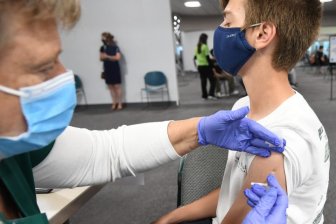The first Indigenous head of the Canadian Bar Association was a law school student in his mid-20s when he met his grandfather and learned he’d survived a “horrible” existence at a residential school in Saskatchewan.

Brad Regehr said much of the trauma Jean-Marie Bear endured at the Sturgeon Landing Residential School starting at age five remained a mystery as part of the country’s colonial legacy, which has weighed heavily on him after the Tk’emlups First Nation said it had found what are believed to be the remains of 215 children at a similar school in Kamloops, B.C.
“My mom told me some stuff but that he wouldn’t talk about it,” Regehr said in an interview.
He said his grandfather was barred from enlisting for service during the First World War because he’d contracted tuberculosis in the residential school.
Regehr, who is Nehiyaw from the Peter Ballantyne Cree Nation in Saskatchewan and a lawyer in Winnipeg, would include the limited details of his grandfather’s experience in presentations over the years but said he’d get so emotional that he stopped mentioning them.

“I could barely finish what I was saying,” said Regehr, who was adopted by a non-Indigenous family during the so-called Sixties Scoop and met his biological family, including his birth mother, about five years before her death.
Regehr called on all Canadians to learn more about the harsh reality of federally funded residential schools, which were operated mostly by the Roman Catholic Church starting in the 1870s until the last one closed in the mid-1990s, in order to understand the generational impact on Indigenous people who are overrepresented in the justice and child welfare systems.
He said systemic racism against Indigenous people extends to the legal profession and Indigenous judges, lawyers and articling students have told him they’ve been mistaken for defendants.
“If anyone thinks there isn’t systemic discrimination within this profession then they’re being wilfully blind,” Regehr said, adding change needs to start by firms examining their inherent bias, which could enable them to recruit more Indigenous staff.
He has also called on the federal government to ensure there’s more diversity among judges.
On June 21, National Indigenous Peoples Day, the nearly 37,000-member Canadian Bar Association will launch a “tool kit” including templates for firms to help guide them toward hiring practices that could attract and retain Indigenous lawyers, articling students and administrative staff.

“It’s to assist firms to go, ‘How do we fix this? What kinds of questions do we need to ask ourselves about our hiring practices?”’ he said.
“There is a hunger for these types of resources.”
The initiative is part of a response to the Truth and Reconciliation Commission’s 2015 report.
Regehr’s one-year term as the first Indigenous president of the bar association since its establishment in 1896 will end in September.
Read more: RCMP played a ‘clear and unavoidable role’ in Canada’s residential schools tragedy: Blair
He said his goal is to keep the organization committed to reconciliation efforts as part of the long process ahead to identify unmarked graves of children from residential schools across Canada. That includes the need for the Roman Catholic Church and the federal government to provide documents that could help identify where the remains of children were buried in unmarked graves.
“People are saying ‘Bring the kids home.’ That has to be done. It has to be resourced. We’ve got to get to the bottom of this.”
Anyone experiencing pain or distress as a result of their residential school experience can access a 24-hour, toll-free and confidential National Indian Residential School Crisis Line at 1-866-925-4419.
© 2021 The Canadian Press
Canadian Bar Association calls on law firms to hire more Indigenous lawyers - Global News
Read More



No comments:
Post a Comment